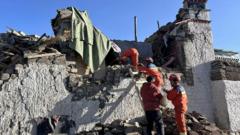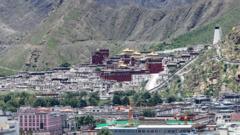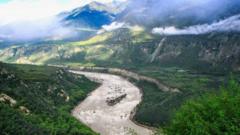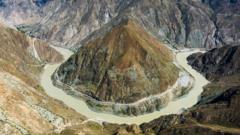Gyalo Thondup was a major figure in Tibetan politics and society, striving tirelessly for the Tibetan cause alongside his more famous brother, the 14th Dalai Lama. His commitment to promoting Tibetan independence and spiritual governance marked a significant chapter in the region's ongoing struggle.
Gyalo Thondup, Key Tibetan Political Figure and Brother of Dalai Lama, Passes Away at 97

Gyalo Thondup, Key Tibetan Political Figure and Brother of Dalai Lama, Passes Away at 97
Gyalo Thondup, a vital political force in Tibetan culture and the elder brother of the Dalai Lama, has died at the age of 97, as confirmed by the Dalai Lama's office.
Gyalo Thondup, the eldest brother of the 14th Dalai Lama, Tenzin Gyatso, has passed away at the age of 97, according to a statement from the Dalai Lama's office. The announcement confirmed that Thondup died on Sunday in Kalimpong, India, as reported by various Tibetan media outlets.
The Dalai Lama expressed profound sorrow over his brother's passing, describing him as “a good man who did his best for the Tibetan cause.” He prayed for Thondup's good rebirth, expressing hope that he would return to serve the Tibetan administration in future incarnations.
Gyalo Thondup held a prominent position within Tibet’s complex political landscape, often recognized as the second most influential person in the region after the Dalai Lama himself. While his brother garnered significant international attention due to his public role in promoting Tibetan autonomy and spiritual matters, Thondup preferred a strategic, behind-the-scenes approach to political advocacy.
Thondup had dedicated his life to securing pathways for his brother to return to Tibet, after the latter went into exile following the 1959 uprising against Chinese rule. Known for his diplomatic skill, he spent decades building relationships with a range of international leaders to galvanize support for the Tibetan independence movement.
Born as part of a farming family in Takster, China, Thondup was one of six children. Unlike his siblings who were headed for religious life, he pursued education abroad, eventually becoming a lifelong adviser and supporter for the Dalai Lama in their shared mission to advocate for Tibet and its people.
The Dalai Lama expressed profound sorrow over his brother's passing, describing him as “a good man who did his best for the Tibetan cause.” He prayed for Thondup's good rebirth, expressing hope that he would return to serve the Tibetan administration in future incarnations.
Gyalo Thondup held a prominent position within Tibet’s complex political landscape, often recognized as the second most influential person in the region after the Dalai Lama himself. While his brother garnered significant international attention due to his public role in promoting Tibetan autonomy and spiritual matters, Thondup preferred a strategic, behind-the-scenes approach to political advocacy.
Thondup had dedicated his life to securing pathways for his brother to return to Tibet, after the latter went into exile following the 1959 uprising against Chinese rule. Known for his diplomatic skill, he spent decades building relationships with a range of international leaders to galvanize support for the Tibetan independence movement.
Born as part of a farming family in Takster, China, Thondup was one of six children. Unlike his siblings who were headed for religious life, he pursued education abroad, eventually becoming a lifelong adviser and supporter for the Dalai Lama in their shared mission to advocate for Tibet and its people.


















